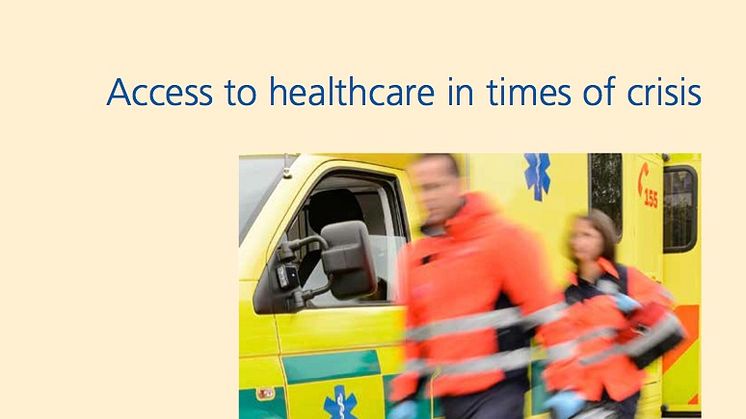
Press release -
Crisis has affected supply and demand in healthcare
(Dublin, Ireland): In the wake of the economic and financial crisis, many European governments have cut spending on healthcare services. At the same time, unemployment, financial strain and reduced prevention have increased the need for certain healthcare services, while falling disposable income has made access to healthcare more difficult for many EU households. This report identifies the groups most likely to face barriers to healthcare as a consequence of the crisis, including a number of new groups that have been generally overlooked by policymakers. It suggests a range of policy pointers, including the need to consider mitigating measures in tandem with policy reform, and suggests policymakers and service providers might consider reviewing crisis responses once financial pressures on EU Member States begin to ease.
While the crisis has been a major factor influencing complex healthcare systems, there are significant differences between countries and between services in the impact it has had on healthcare access. Even where a country’s health services have experienced few cuts, it has still been possible to identify impacts of the crisis on access to healthcare.
Vulnerable groups and the newly vulnerable
Groups in vulnerable situations, for whom difficulties in accessing healthcare have long been more common, have in some cases faced cuts in measures facilitating access. These include people living in remote areas; those with low health literacy, poor education and low incomes; people with greater healthcare needs in general (such as people with disabilities, elderly people and people with chronic illnesses), as well as homeless people and migrants.
The crisis has resulted in the emergence of new groups that were not considered vulnerable previously due to increased unemployment, especially among young men, and increased household debt problems, particularly for young couples facing housing and job insecurity.
This report explores which population groups have experienced reduced access to healthcare as a result of the crisis. It presents examples of measures taken by governments and service providers to maintain access for groups in vulnerable situations, such as economising and leniency in enforcing copayments.
Implications for policy and services
Policymakers and service providers need to be aware of the unexpected or indirect consequences of cuts and reduced disposable income on access to services. In some countries, demand for nursing home care has declined because the pensions of elderly relatives are an important source of household income. In some cases, people have moved from private to public healthcare creating increased demand, while in others private hospitals have gained more clientele partly as an indirect consequence of the crisis.
In addressing the challenge of maintaining access in the context of the crisis, policymakers and service providers may consider:
● integrating mitigating measures into cost-cutting policies, rather than reacting to problems after reforms are implemented;
● determining whether incremental responses to the new situation – creating a complex network of exemptions – may be worse than overhauling the system as a whole;
● recognising that investing in the working conditions of healthcare staff, apart from salaries, can be an effective option to tackle staff shortages;
● developing alternative care infrastructures when deinstitutionalisation and reduced reliance on inpatient care have been accelerated;
● making investments in the short run, for example, in ICT, self-help facilities, and home and ambulatory care, to free up resources in the longer term;
Related links
Topics
The European Foundation for the Improvement of Living and Working conditions (Eurofound) is a tripartite European Union Agency, whose role is to provide knowledge in the area of social and work-related policies. Eurofound was established in 1975 by Council Regulation (EEC) No. 1365/75.
For more information about Eurofound and its work, and free access to all our data and findings, visit our website and follow us on these social media channels: Twitter, LinkedIn, Facebook, Google+, YouTube, or Flickr.

